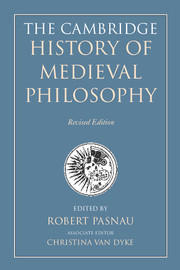Book contents
- Frontmatter
- Contents of Volume 1
- Preface
- List of contributors
- Frontmatter
- Contents of Volume 2
- Introduction
- I Fundamentals
- II Logic and language
- III Natural philosophy
- IV Soul and knowledge
- V Will and desire
- VI Ethics
- 33 Happiness
- 34 Identity and moral agency
- 35 The inclination for justice
- 36 Virtue theory
- 37 Action and intention
- 38 Practical ethics
- VII Political philosophy
- VIII Metaphysics
- IX Theology
- Appendices
- Bibliography of primary sources
- Bibliography of secondary sources
- Index nominum
- Index rerum
- References
36 - Virtue theory
from VI - Ethics
Published online by Cambridge University Press: 05 August 2014
- Frontmatter
- Contents of Volume 1
- Preface
- List of contributors
- Frontmatter
- Contents of Volume 2
- Introduction
- I Fundamentals
- II Logic and language
- III Natural philosophy
- IV Soul and knowledge
- V Will and desire
- VI Ethics
- 33 Happiness
- 34 Identity and moral agency
- 35 The inclination for justice
- 36 Virtue theory
- 37 Action and intention
- 38 Practical ethics
- VII Political philosophy
- VIII Metaphysics
- IX Theology
- Appendices
- Bibliography of primary sources
- Bibliography of secondary sources
- Index nominum
- Index rerum
- References
Summary
BASIC ISSUES
From antiquity through the Hellenistic era, all the leading philosophers argued that people acquire virtues naturally, through their own learning and practice. As we are the sole or principal cause of our virtues, so too are we the sole or principal cause of our happiness. The theocentric ethics favored by later Jews, Christians, and Muslims left open to question what insights might be gleaned from these earlier anthropocentric theories. As a result, disputes about the various causal theses of ancient ethics run like a leitmotif through the medieval literature. Are virtues God-given, or can we acquire them just by exercising the natural human capacities of intellect and will? Are virtues sufficient, or even necessary, for obedience to God’s law? Is happiness, whether now or in the afterlife, actually caused by our virtues, or is it a divine reward – perhaps even simply a divine gift?
On the whole, medieval thinkers concentrated less on criticizing earlier views than on developing alternative theories of virtue. In constructing such theories they argued as much with each other as they did with the teachings of ancient philosophers. As it was open to debate how philosophical works should be interpreted, so it was open to debate how Scripture and the “authoritative” works of one’s own religious tradition should be interpreted. Much of what today is orthodox doctrine was still in the making. For instance, even Muslims who agreed that people attain complete happiness only in the afterlife disagreed about how this relates to virtue. Inspired by Neoplatonic teachings, Avicenna described the soul’s fortunes after the death of the body as the effect of the individual’s own conduct in this life. Eternal happiness is achieved by acquiring the moral dispositions necessary to purify one’s soul; it is not some external reward meted out by God for good behavior.
- Type
- Chapter
- Information
- The Cambridge History of Medieval Philosophy , pp. 493 - 505Publisher: Cambridge University PressPrint publication year: 2014



